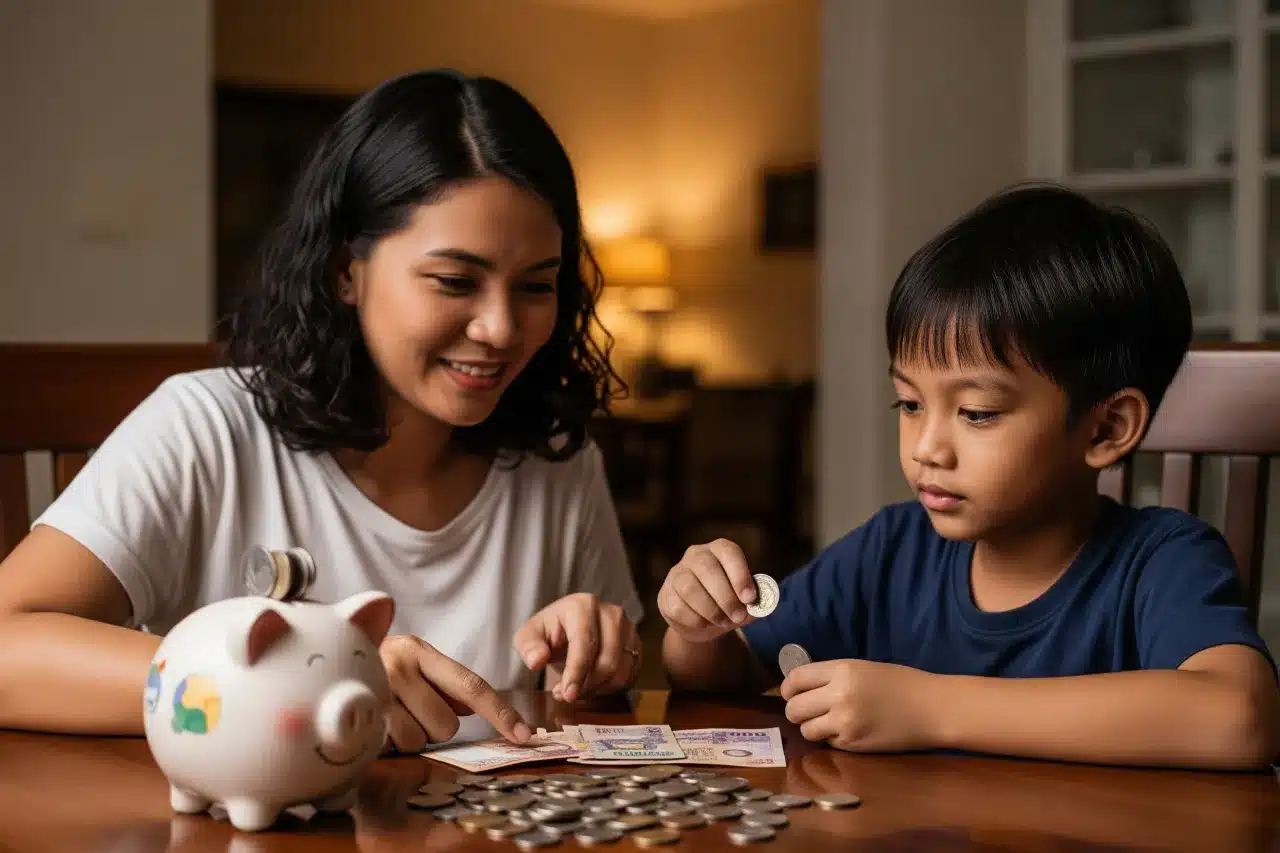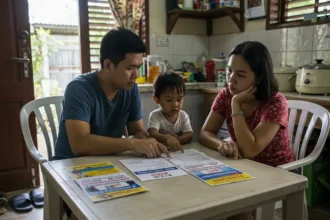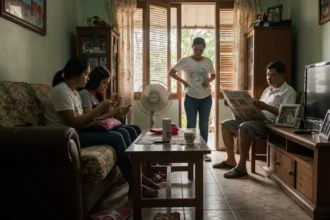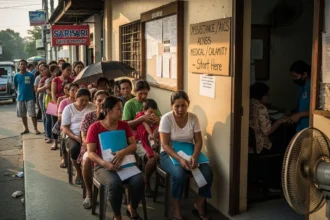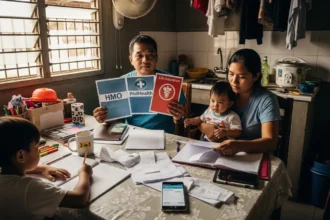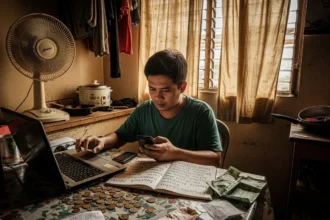In many Filipino households, money is one of the most awkward topics. Parents freely talk about grades, chores, even love lives – but when it comes to finances, conversations often stop at “Mahal ’yan, wag ka na bumili.” For generations, money talk has been treated as an adult-only subject, hidden from children “para hindi maburden.” But this silence often means kids grow up without the tools to manage money when they finally earn their first paycheck.
- 🏠 Why Pinoy Families Avoid Money Talk
- 📚 When Should You Start Teaching Kids About Money?
- 🪙 Table: Age-Appropriate Money Lessons for Filipino Kids
- 💡 How to Make Money Talks Less Awkward
- 👩👧 Allowance: Teach or Spoil?
- Talking About Money: A Guide for Filipino Parents
- 🌍 What Filipino Kids Can Learn from Abroad
- Frequently Asked Questions about Talking Money with Filipino Kids
- Looking Ahead: Raising Money-Smart Pinoys 🇵🇭💡
- 🏦 References
Studies show that children form financial habits as early as age 7. That means if parents don’t step in early, kids might learn from TV ads, peers, or social media influencers instead. Worse, they may adopt unhealthy money mindsets: instant gratification, “utang lang muna,” or equating success with expensive things.
In this feature, we’ll explore how Filipino parents can break the silence around money – without scaring kids, without making it awkward, and without losing our uniquely Pinoy values of diskarte, pagtitipid, and pagbibigay.
🏠 Why Pinoy Families Avoid Money Talk
For many parents, money feels like a private matter. Some grew up in poverty and believe discussing finances with kids will only cause stress. Others fear their children will “feel kawawa” if they realize how tight the budget is.
But avoiding the topic has consequences:
- Kids might grow up entitled, thinking money is unlimited.
- Teens may be unprepared to manage allowances, scholarships, or part-time jobs.
- Young adults may struggle with debt the first time they get a credit card.
Anecdote:
Take Tita Liza, a single mom in Quezon City. For years, she never told her son why she often skipped buying new clothes for herself. One day, her son asked for a gaming console worth ₱20,000. She felt guilty saying no – until she finally explained the family budget and how tuition, rent, and food take priority. To her surprise, her son didn’t throw a tantrum. Instead, he asked if he could save part of his allowance to help buy it later. That conversation changed how he viewed money – from demand to responsibility.
📚 When Should You Start Teaching Kids About Money?
Financial lessons don’t have to wait until high school. Experts recommend starting as soon as kids can count coins. Here’s a guide:
- Ages 4–6 – Teach the difference between coins and bills. Introduce the piggy bank.
- Ages 7–10 – Give small allowances. Teach saving vs. spending.
- Ages 11–14 – Introduce budgeting, needs vs. wants, and simple family expenses.
- Ages 15–18 – Discuss bigger concepts: bank accounts, interest, credit cards, even small investments.
By the time they reach college, kids should already know that money is earned, saved, and managed – not magically provided by parents.
🪙 Table: Age-Appropriate Money Lessons for Filipino Kids
| Age Group | Key Lesson | Example Activity |
|---|---|---|
| 4–6 years old | Recognizing money | Sorting coins into jars or piggy banks |
| 7–10 years old | Saving vs. spending | Give weekly allowance, encourage savings |
| 11–14 years old | Budgeting basics | Let them plan a small family outing budget |
| 15–18 years old | Banking & credit responsibility | Open a savings account with them |
💡 How to Make Money Talks Less Awkward
- Start during casual moments (grocery trips, meal times, or while paying bills).
- Use relatable examples (“Kung mag-iipon ka ng ₱20 a day, after a month may ₱600 ka na.”).
- Be honest but age-appropriate. Kids don’t need exact salaries, just the idea of limits and priorities.
- Share your mistakes too. Admitting you once fell into debt teaches humility and wisdom.
- Use humor – money doesn’t always need to feel heavy.
👩👧 Allowance: Teach or Spoil?
One of the most common dilemmas: Should kids be given allowances, or should they earn money through chores?
Many Pinoy parents worry that allowances create dependency. But experts say allowances are a training tool, not just free money. The key is structure:
- Set a fixed allowance and stick to it.
- Teach kids to budget it for snacks, transportation, or small wants.
- If they overspend, don’t bail them out immediately. Natural consequences are good teachers.
- For extra money, they can do bonus chores or help in family businesses.
Anecdote:
In Cebu, a 13-year-old boy named Carlo blew his entire weekly allowance on milk tea in two days. Instead of giving him more cash, his parents told him to make baon from home. By the third week, Carlo learned to save part of his allowance and even started selling extra snacks to classmates for a small profit.
Talking About Money: A Guide for Filipino Parents
In many Filipino households, money is a sensitive topic, often discussed in hushed tones or avoided altogether. However, teaching children about finances from a young age is one of the most valuable lessons a parent can provide. It lays the foundation for a lifetime of responsible decisions and financial well-being. Here’s a deeper look at the pros of starting these conversations early and the common mistakes to avoid.
✅ The Pros of Talking About Money Early
1. Builds Financial Responsibility from a Young Age When children understand that money is a finite resource that needs to be managed, they begin to develop a sense of responsibility. This starts with simple concepts like managing their daily allowance (baon). You can teach them to budget for their snacks and save a small portion for something they want. This early practice in saving, spending, and budgeting demystifies financial concepts and turns them into practical, lifelong habits.
2. Reduces Entitlement and Encourages Gratitude Children who are not taught the value of money may develop a sense of entitlement, believing that things will always be provided for them without understanding the effort involved. When you openly discuss that money is earned through hard work, it helps them appreciate what they have. They begin to understand that the new toy, the family vacation, or even the food on the table is the result of their parents’ labor. This fosters genuine gratitude and a more grounded perspective on material possessions.
3. Prepares Teens for Real-Life Money Decisions The transition to adulthood comes with a host of financial responsibilities, from managing a first salary to paying bills and saving for the future. A teenager who has never had a meaningful conversation about money will be ill-prepared for these challenges. By discussing topics like the cost of utilities, the importance of an emergency fund, and the basics of banking, you are equipping them with the practical knowledge they need to navigate their financial independence successfully.
4. Strengthens Trust Between Parent and Child Talking openly about family finances builds a strong foundation of trust and honesty. When you include your children in age-appropriate discussions about the family budget or savings goals, you are treating them as respected members of the family unit. This openness makes them more likely to come to you with their own financial questions or problems in the future, creating a safe space for dialogue rather than a relationship built on secrecy and avoidance.
5. Helps Kids Understand Family Sacrifices Children often don’t see the difficult choices parents make behind the scenes. Explaining why you can’t afford a new gadget or why you’re choosing a more modest vacation helps them understand the concept of trade-offs and sacrifices. For example, saying, “We are saving up for your college education, so we need to spend less on eating out for now,” connects their future well-being with the family’s current financial decisions. This context helps them appreciate the sacrifices made for their benefit and fosters a sense of teamwork.
❌ Common Mistakes Parents Make (And How to Avoid Them)
1. Using Money Only as a Punishment or Reward One of the most common mistakes is tying money directly to behavior or academic performance, such as saying, “Walang baon kasi bagsak ka.” (No allowance because you failed). This approach creates an unhealthy and often anxious emotional connection to money. It teaches children that money is a tool for control, not a resource to be managed.
- What to do instead: Separate financial lessons from discipline. Use non-monetary consequences for bad behavior and offer praise or quality time as rewards for achievements. Keep their allowance consistent so they can learn to budget reliably.
2. Refusing to Discuss Money at All, Leaving Kids Clueless The “money is an adult topic” mindset is a major disservice to children. By avoiding the subject, you leave them financially illiterate and vulnerable to making significant mistakes later in life. They may grow up with financial anxiety, develop poor spending habits, or become easy targets for debt and scams because they were never taught the basics.
- What to do instead: Start with age-appropriate concepts. For young children, focus on identifying coins and the concept of saving. For pre-teens, introduce budgeting their allowance. For teenagers, discuss banking, saving for goals, and the responsible use of credit.
3. Over-disclosing – Sharing Stress in a Way That Overwhelms Kids While honesty is important, there is a fine line between being transparent and burdening your children with your financial anxieties. Sharing details about mounting debts, job insecurity, or intense financial stress can create fear and anxiety in a child who is not emotionally equipped to handle it.
- What to do instead: Frame financial challenges in a constructive, reassuring way. Instead of saying, “We’re broke and might lose the house,” you can say, “We need to be more careful with our spending as a family for a while to save more money. Let’s all work together to find ways we can help.”
4. Always Bailing Kids Out of Overspending It’s natural to want to help your child, but constantly rescuing them from their financial mistakes removes a crucial learning opportunity. If your child spends their entire weekly allowance in two days and you immediately give them more money, you are teaching them that there are no consequences for poor planning.
- What to do instead: Let them experience the natural consequences of their actions. If they run out of money, they will have to wait until their next allowance. This experience is a powerful, memorable lesson in budgeting and self-control that will serve them well for the rest of their lives.
🌍 What Filipino Kids Can Learn from Abroad
In Japan, kids as young as 6 help with grocery shopping, learning about costs early. In the U.S., teenagers often work part-time jobs, giving them a sense of independence. Meanwhile, in Singapore, financial literacy is included in schools’ core subjects.
The Philippines has begun small steps, like the DepEd’s financial literacy curriculum, but families remain the most powerful teachers.
Frequently Asked Questions about Talking Money with Filipino Kids
- Why do many Filipino parents avoid talking about money with their kids?
Because they feel it’s too “adult,” or worry it’ll stress the child or make them feel sorry for the family. Sometimes parents don’t want kids to worry about bills or budgets. But hiding it often means kids don’t learn how money works-how to save, spend wisely, or understand trade-offs. - At what age should I start teaching my child about money?
You can start very early-around ages 4-6 just introducing coins vs bills, piggy banks, simple saving ideas. Then progressively: 7-10 for allowance and spending vs saving; 11-14 for budgeting small things; 15-18 for more complex topics like banks, interest, maybe credit. It grows with them. - What are good age-appropriate money lessons for different stages?
For 4-6: letting them sort coins, use piggy bank.
For 7-10: give a weekly allowance, let them decide small purchases, maybe save for something they really want.
Ages 11-14: planning a small family outing budget, comparing needs vs wants, simple tracking of spending.
15-18: discussing bank accounts, maybe helping them open one, teaching about interest, maybe talking about investments. - Should I tie allowance to chores or give it freely?
Many suggest a mix works best. Fixed allowance helps kids learn money management. Chores teach responsibility and that money often comes from effort. If you combine both, kids learn both discipline and that money isn’t automatic. - What if my child keeps overspending their allowance?
Let them feel the consequence. If money runs out, they need to wait for the next allowance. At the same time, guide them-help them plan, maybe divide their allowance into portions (for snacks, savings, etc.). Over time, they’ll learn better planning from mistakes without shame. - How much allowance is “enough” for kids?
It depends on age, what the allowance is meant for (snacks, small purchases, etc.), where you live, and how often. For grade-schoolers, something modest. For high schoolers, more. The point is not the amount but that it’s consistent so kids can plan. - Should I tell my kids exactly how much money the family earns or what the bills are?
Not always in full detail-that could overwhelm younger kids. But being honest in general terms helps: saying that money is limited, things have priorities (tuition, food, etc.) before non-essentials. It builds trust, helps them appreciate what you do, and it’s less scary than pretending money grows on trees. - How do I explain debt or borrowing to my children?
Use simple words: debt is money borrowed now that needs to be paid back later, sometimes with extra (interest). Explain that borrowing isn’t bad but doing it without thinking or overdoing it can cause stress. Maybe use examples (like paying back borrowed money for movies, treat) to make it relatable. - Is it okay for teenagers to work part-time or help at home/business to learn about making money?
Yes, as long as it doesn’t harm schoolwork or health. It’s a great way to learn work ethic, saving, independence. Helping in family business, small jobs or freelancing are good opportunities-just make sure they still have time to rest, study, have fun. - What are common mistakes parents make when talking about money, and how do I avoid them?
Some common ones: using money as a punishment (no allowance if grades drop), over-rescuing kids when they overspend, or hiding financial reality completely. To avoid: separate money lessons from discipline, allow natural consequences, be consistent, honest (age-appropriate), and use everyday moments (shopping, paying bills) as teaching moments.
Looking Ahead: Raising Money-Smart Pinoys 🇵🇭💡
Teaching kids about money doesn’t mean burdening them with adult problems. It means equipping them with life skills so they won’t repeat past mistakes or fall into debt traps. Conversations about allowance, savings, or even budgeting for Jollibee meals may seem small, but over time, they shape kids into financially wise adults.
If Filipino parents can normalize these talks the same way we discuss grades or chores, we’ll raise a generation that knows how to balance diskarte with discipline, generosity with responsibility, and spending with saving.
Because at the end of the day, the best inheritance we can leave our kids isn’t just property or savings accounts – it’s the wisdom to handle money with respect and purpose.
🏦 References
-
InLife – How to Teach Your Kids About Money
-
Maya – 5 Practical Budgeting Tips for Growing Filipino Families
-
Inquirer Business – Teaching Our Teenage Children About Money
-
RemoteStaff PH – AI and Money: Teaching Kids Financial Literacy
-
Cha-Ching (Prudence Foundation, DepEd) – Cha-Ching: Philippine Financial Curriculum for Kids
-
Parents’ Guide (BPI-AIA) – Teaching Children the Value of Money



